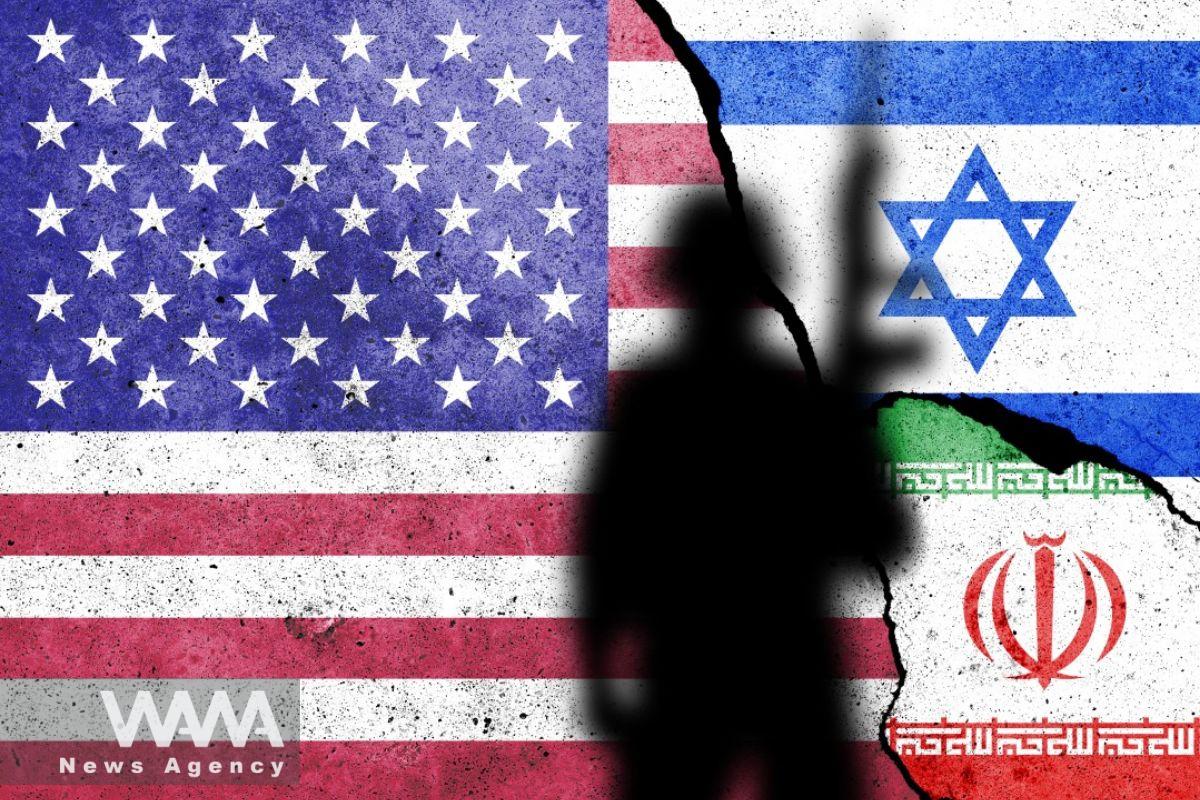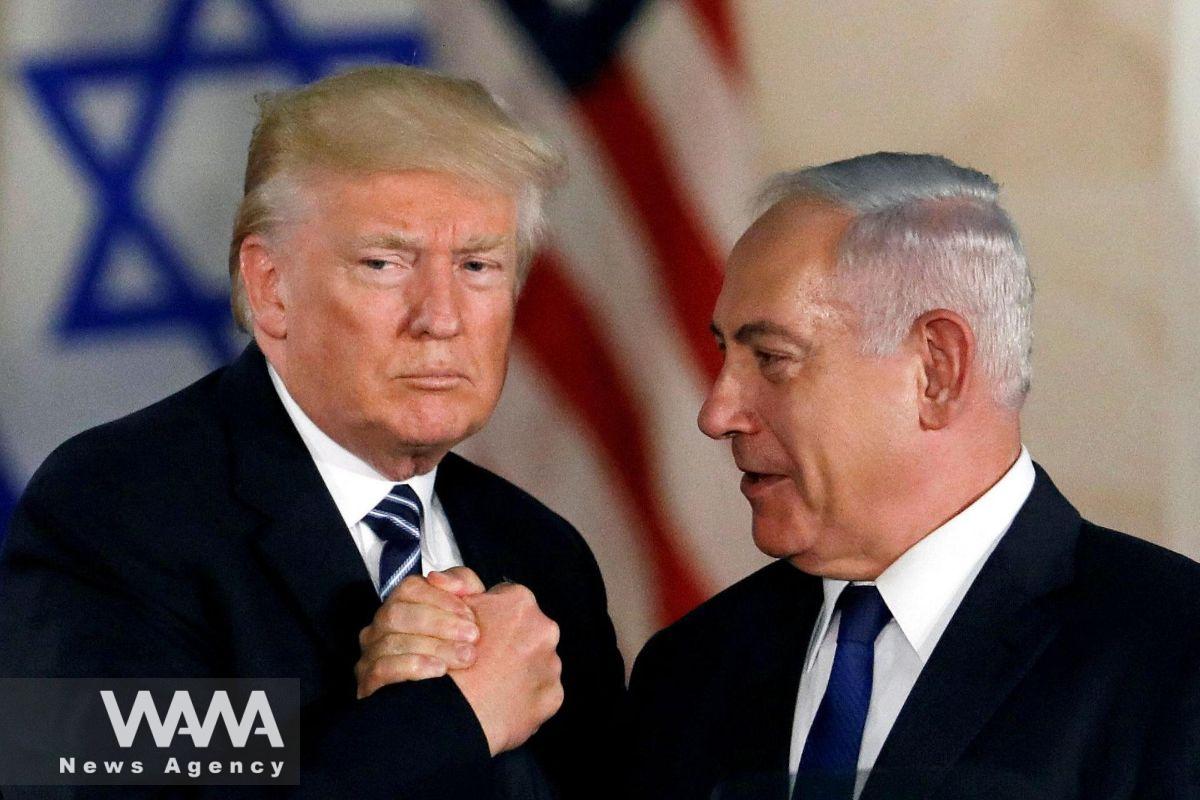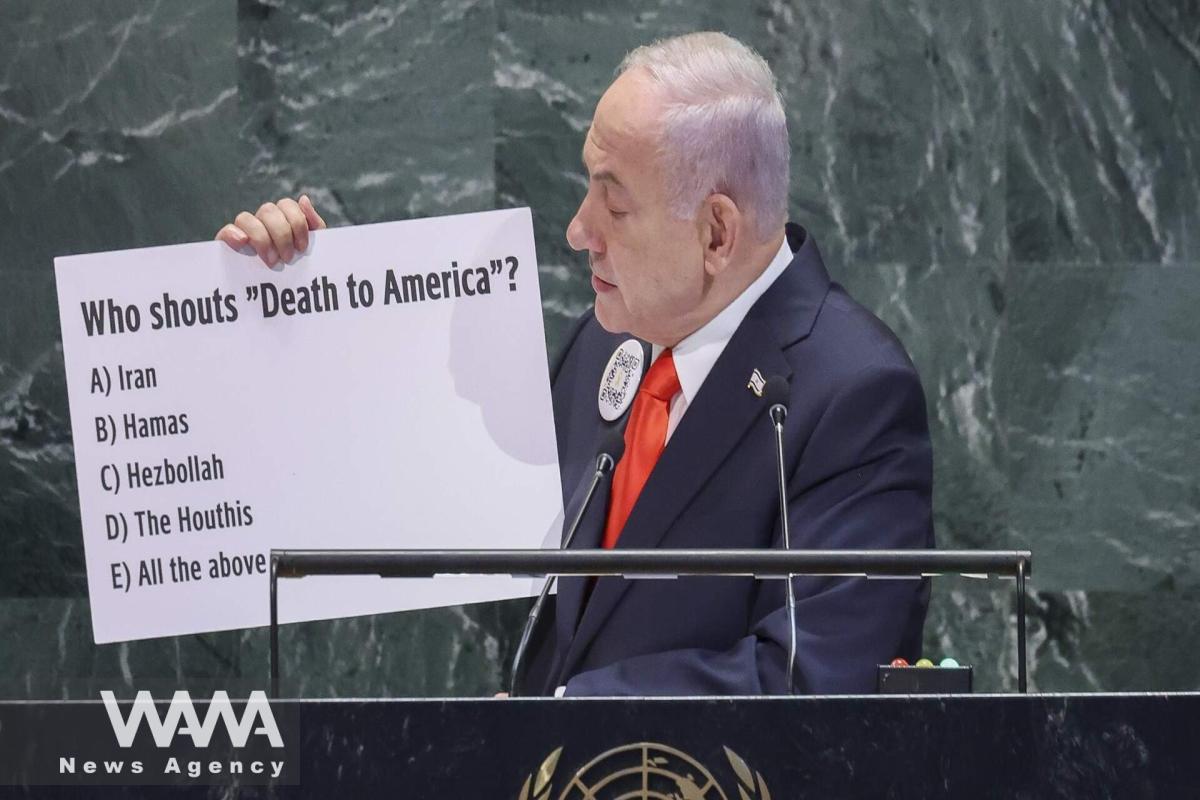WANA (Oct 03) – The alliance between Donald Trump, President of the United States, and Benjamin Netanyahu, Prime Minister of the Israeli regهime, will be recorded as one of the darkest episodes in history — comparable to the sinister alliance of Adolf Hitler and his Italian counterpart Benito Mussolini.
Netanyahu traveled to Washington on the sidelines of the UN General Assembly to meet with Trump, and a new round of conspiracies began. During that visit Trump unveiled a plan to halt the war in Gaza that differs little from previous proposals or from what was expected of the United States. The plan envisages the toppling of Hamas’s rule in Gaza, the continued presence of the Israeli regime there, and the shifting of governmental and military costs onto international actors — particularly Arab states.
Netanyahu’s Speech to Empty Chairs at the UN. Social media / WANA News Agency
Key points Important aspects of the meeting between the leaders of the United States and the Israeli regime and of Trump’s plan are examined below.
1 — Ending Israel’s isolation: Shortly before the White House meeting, one of the largest displays of the Israeli regime’s political isolation in history had been recorded. Diplomatic delegations walked out of the General Assembly during Netanyahu’s speech in protest at his crimes in Gaza — the most prominent manifestation of that isolation — but it was not the only one. Threats of expulsion from UEFA and the removal of the Israeli cycling team from an Italian race were sporting expressions of that isolation.
At the same time, the coordinated move by 140 countries — roughly two-thirds of the world’s governments — to create conditions for recognition of a Palestinian state, coinciding with the leaders’ meeting at the General Assembly, put enormous pressure on Israel and the United States. Trump administration officials warned and repeatedly voiced their displeasure with the governments participating in that initiative; nevertheless, these actions did not change the behavior of the majority of the world’s states, leaving Tel Aviv deeply isolated and seeking to draw Washington into partnership.
In his meeting with Netanyahu, Trump tried to reduce Israel’s isolation. The ceasefire plan for Gaza was presented on that basis — to end the fighting and halt Israel’s growing international isolation.
As Netanyahu began his address at the UN General Assembly, a large number of diplomats from various countries walked out of the hall. Social media / WANA News Agency
2 — Bolstering Netanyahu’s standing: Strengthening Netanyahu’s personal standing matters to Trump. This became fully evident when the U.S. president threatened Israel’s judiciary over its investigation of the prime minister’s corruption cases. The U.S. ambassador to the occupied territories, through consultations with parties withdrawing from the governing coalition, revealed another dimension of how important Netanyahu is to Trump.
Trump, who has previously described Netanyahu as a wartime leader, reiterated that claim. Netanyahu’s significance to Trump likely stems from his public backing of far-right currents and parties allied with them within the Western political sphere. Although within Israeli society the Likud party under Netanyahu is not identical to the extremist parties associated with Ben-Gvir and Smotrich and is generally known as a right-wing party, by Western standards Likud under Netanyahu is considered far-right. Furthermore, Trump favors shock military and security actions that, if Netanyahu remains in power, could be easily carried out via Tel Aviv.

WANA (Oct 02) – Newly released documents reveal that the Israeli government has been paying American influencers up to $7,000 for each supportive post on social media platforms such as Instagram and TikTok, in an effort to counter declining public support in the United States. According to reports, the documents—filed under the Foreign Agents […]
3 — Erasing the effects of the attack on Qatar: Israel’s attack on Qatar had specific motives. The coincidence of that attack with the timing of a joint European-Arab move to recognize Palestine raised the possibility that, with Washington’s backing, Tel Aviv sought to intimidate the shared interests of Europe and the Arab world. The negative reaction and waves of global condemnation — especially from the West and the region — signaled to Israel that, although intimidation had been attempted, it would not bring major immediate results.
One concrete consequence was Saudi Arabia signing a defense pact with Pakistan, a Chinese ally and nuclear-armed state. Observing these fallout effects, Trump sought to manage the negative consequences. He convened a meeting with leaders of several Muslim countries — including representatives from Qatar, Saudi Arabia, Turkey, and Pakistan — and pressured Netanyahu into apologizing to Qatar in a phone call with Doha’s leaders, underscoring the heavy costs of Tel Aviv’s error.
Gradually, regional and global perceptions of the war in Gaza have shifted, and many have understood that the target is not only this strip of land but larger, more distant aims. To prevent this trend from solidifying, Trump has tried to reassure governments that the Gaza war did not have those wider objectives and that it is on the verge of ending.
An image of the blast site in Qatar. Social media / WANA News Agency
4 — Reducing Israeli attrition: According to recent statistics, one third of the spouses of Israeli reserve soldiers — due to their partners’ participation in the war and the resulting separation from family — have contemplated divorce. Intensified debates over conscripting the Haredi religious community have caused that group to withdraw from the governing coalition and may provoke stronger backlash if pressure continues. Israeli society lacks the capacity to sustain a grinding war in Gaza, and to preserve the regime and Netanyahu’s government, Trump has opted for a change in the battlefield posture.
5 — Preserving capacity for attacks on other targets: Netanyahu and U.S. officials have, through overt and covert threats, disclosed their intentions to expand the war.
In his UN General Assembly speech Netanyahu threatened military action against Iraq; likewise, the U.S. government, while threatening Iraqi resistance groups and the Iraqi state, is pursuing political change in Iraq with the help of certain domestic actors. In addition to Iraq, other countries such as Lebanon and Yemen are also potential targets.

WANA (Oct 01) – Aviation sources report unusual movements of U.S. refueling aircraft, saying that in recent days the skies of the Persian Gulf have witnessed intensified activity of American fighter jets and tankers. The Al-Udeid base in Qatar has once again become a focal point, as giant refueling planes land one after another, adding […]
Israelis previously issued threats against African countries involved in logistical efforts to bolster resistance in the Levant, and it is plausible they may act on those threats. Sudan’s renewed alignment with the axis of resistance and the possibility of simultaneous activity in the eastern and western Red Sea have increased the likelihood that Israel might strike Sudan or Yemen to prevent the consolidation of a continuous resistance belt in the region.
Yemen and Sudan share similar problems: their central governments do not control the entire country. Currently, opponents in Yemen are quiet, whereas in Sudan the paramilitary Rapid Support Forces led by Mohammad Hamdan Dagalo remain active.
It is possible that Israel will carry out precise attacks in Sudan, assassinate its political and military leaders, and hit key military bases to pave the way for an offensive against Dagalo, with the intention that Sudan repeat the fate of Syria and Assad’s fall.

WANA (Sep 30) – Abu Reza al-Anzi, commander of the “Jund al-Imam” brigades within Iraq’s Popular Mobilization Forces, stressed that the country’s resistance is capable of inflicting damage on Israel — a reality that, he said, has led to anxiety and threats from the Israeli prime minister. Benjamin Netanyahu, during the 80th session of […]
From an Israeli perspective, given the circumstances, the chance of success in Sudan appears high; conquering a large and significant country in the Muslim world would serve as a symbolic victory. Sudan — once the largest Muslim country before its partition — faces the risk of renewed fragmentation or the fall of its capital and has long been a strategic target for Israel. During the assassination of martyr Fouad Shukr, commander-in-chief of the Lebanese resistance, and martyr Ismail Haniya, head of Hamas’s political bureau, an almost simultaneous attempt was made to assassinate Abdel Fattah al-Burhan, head of Sudan’s Sovereignty Council, but that effort failed.
6 — Returning to the Abraham Accords arrangements: Under the Abraham Accords and related processes, several important Arab states cooperated with Israel to suppress resistance in the region, including in Palestine.
The October 7 operations halted that trend, and subsequent proclamations of a purported “Greater Israel” and the attack on Doha reversed it. Trump’s plan to stop the Gaza war aligns with the shared desires of Israel and certain Arab governments, in which the destruction of resistance is a stated objective.


